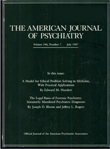Placebo-controlled trial of fluoxetine and phenelzine for obsessive- compulsive disorder
Abstract
OBJECTIVE: It is now well documented that fluoxetine is a viable treatment option for patients with obsessive-compulsive disorder (OCD), and there is a small body of evidence indicating that monoamine oxidase inhibitors may be effective in at least a subset of patients. The authors conducted a 10-week placebo-controlled trial of these two agents in patients who met DSM-III-R criteria for OCD. METHOD: Sixty- four subjects were randomly assigned to receive placebo, phenelzine (60 mg/day), or fluoxetine (80 mg/day). These doses were achieved by the end of week 3 of the active phase of the study. Outcomes were assessed with standardized instruments to measure OCD, mood, and anxiety. RESULTS: Fifty-four patients completed the study. There was a significant difference among the three treatments on one OCD scale, with fluoxetine-treated patients improving significantly more than those in the placebo or phenelzine group. A subgroup of OCD patients with symmetry obsessions did respond to phenelzine. CONCLUSIONS: This study provides no evidence to support the use of phenelzine in OCD except possibly for those patients with symmetry or other atypical obsessions. There was also no support for the hypothesis that patients with high levels of anxiety would respond preferentially to phenelzine.



